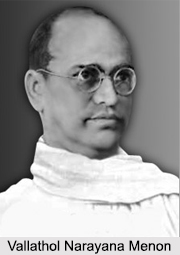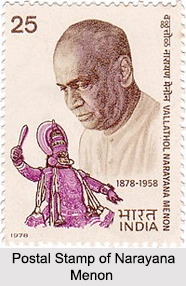 Vallathol Narayana Menon was a modern Malayali poet. He was a traditional classicist poet who had transformed himself into a popular Romantic bard. Vallathol outlived the other two members of the Great Trio and went on to become one of the most recognized poets of modern India. Vallathol`s first major work, Badhira Vilapam (A Deaf Man`s Lament), was published in 1910 and it); it dealt with the poet`s loss of hearing, his sense of deprivation of the world. He was a nationalist poet and wrote a series of poems on various aspects of the Indian freedom movement. He also wrote against caste restriction, tyrannies and orthodoxies. He founded the Kerala Kalamandalam and is credited with reviving the traditional Keralite dance form known as Kathakali. Popularly known as Mahakavi, Vallathol Narayana Menon wrote the very famous `Sahithya Manjari`. For his work `Chitrayogam`, he was given the title `Mahakavi`. Vallathol Narayana Menon died in the year 1958. Government of India honoured this renowned poet with the prestigious Padma Bhushan Award in the year 1955.
Vallathol Narayana Menon was a modern Malayali poet. He was a traditional classicist poet who had transformed himself into a popular Romantic bard. Vallathol outlived the other two members of the Great Trio and went on to become one of the most recognized poets of modern India. Vallathol`s first major work, Badhira Vilapam (A Deaf Man`s Lament), was published in 1910 and it); it dealt with the poet`s loss of hearing, his sense of deprivation of the world. He was a nationalist poet and wrote a series of poems on various aspects of the Indian freedom movement. He also wrote against caste restriction, tyrannies and orthodoxies. He founded the Kerala Kalamandalam and is credited with reviving the traditional Keralite dance form known as Kathakali. Popularly known as Mahakavi, Vallathol Narayana Menon wrote the very famous `Sahithya Manjari`. For his work `Chitrayogam`, he was given the title `Mahakavi`. Vallathol Narayana Menon died in the year 1958. Government of India honoured this renowned poet with the prestigious Padma Bhushan Award in the year 1955.
Early Life of Vallathol Narayana Menon
Vallathol Narayana Menon was born in Chennara in Malappuram District of Kerala in 1878. His parents are Kadungotte Mallisseri Damodaran Elayathu and Kuttipparu Amma. He did not receive any formal education in his life but was trained in Sanskrit language. He was also trained with some medical treatise by Ramunni Menon by which he soon began helping his uncle in his medical practice and teaching. He was also trained in Philosophy and Logic for a year by Parakkulam Subrahmanya Sastri and Kaikkulangara Rama Variar. He married Vanneri Chittazhiveettil Madhavi Amma in November 1901 and shifted to Thrissur. He worked as manager in the Kalpadrumam Press in Thrissur from 1905 to 1910. During this period, his hearing began to deteriorate. From 1915, he started working in Keralodayam newspaper and later joined Amrit Ritesh, a journal published from Thrissur.
Literary Revolution of Vallathol Narayana Menon
In 1916, when the first of his eight-volume masterpiece "Sahitya Manjari" (A Bouquet of Literature), appeared, he was immediately recognized as a significant voice, particularly because of his use of both the Sanskrit and Dravidian meters in his lyrical poetry. Even though his earlier poetry, like much of the poetry of Asan and Ullur, was rooted primarily in the Sanskrit tradition and in religious themes, Vallathol changed with the times, and became an integral part of the nationalist consciousness sweeping the land. He wanted to go beyond the regionalism of the traditional Kerala style and the orthodox outlook of Sanskrit legacy.
 Contributions of Vallathol Narayana Menon
Contributions of Vallathol Narayana Menon
The Gandhian movement transformed him into a modernist with broader nationalist aspirations. His poem "Ente Gurunathan" is an expressive tribute to Mahatma Gandhi in his praise. This poem pointed at the direction in which his future poetry was to be moulded. His celebrated works such as Bandanasthanaya "Animdhan", "Vimsrinkala", "Divaswapnam", "Achanum Makalum" and "Magdalana Mariam have reinforced the poet`s commitment to larger issues of life and society. His "Khandakavya" on the life of Mary Magdalene continues to be popular. It also paved the way for a new tradition of Christian symbolism in Malayalam. A literary tradition which was trying to move away from the mythological theme found an easier transition in the figures of the gospel, Gandhi and Lord Buddha. Though Vallathol did not have the benefit of the English education that Asan and Ullur had, he did try to imbibe Western traditions. Through his efforts to bring Kathakali out of feudal control, Vallathol also modernized a theatre that had dominated the literary scene for at least four centuries. Vallathol Narayana Menon, in addition to his poems, also translated the Rig Veda and Ramayana into Malayalam language.
Themes of Vallathol Narayana Menon"s Poems
Vallathol had a variety of themes in his poetry. He did not only handle patriotic or semi-religious themes, but his love-lyrics and particularly the descriptions of nature are picturesque and unforgettable. His poems about rains in Malabar, his description of the feelings of frail farmers and tenacious tillers, his echoing the ocean and thunder dialogue, his poems about children of the workers and fighters are all intrinsically interwoven and charged with an exceptional insight and scintillating sincerity. Vallathol`s works were motivated by serving the language and the people at the same time and they were steeped in classics.
Works of Vallathol Narayana Menon
The works of Vallathol Narayana Menon are as follows:
•Abhivadyam
•Achanum Makalum
•Allah
•Badhiravilapam
•Bandhanasthanaya Anirudhan
•Bapuji
•Bhaval Sthotramala
•Chitrayogam
•Dandakaranyam
•Divaswapnam
•Ente Gurunathan
•Indiayude Karachil
•Kavya Manjusha
•Kochu Seetha
•Magdalana Mariyam
•Naagila
•Oru Kunju Athava Rugminiyude Pashchathapam
•Onapputava
•Oushadhaharanam
•Patmadalam
•Paralokam
•Randaksharam
•Rakshasakrithyam Kilippattu
•Ritu Vilasam
•Russiayil
•Saranamayyappa
•Sishyanum Makanum
•Sahitya Manjari - 11 Volumes
•Sthree
•Vallathol Sudha - Two Volumes
•Vallatholinte Khandakavyangal
•Vallatholinte Padyakrithikal
•Vilasa Lathika
•Vishukkani
•Veera Sringala
•Arogya Chinthamani
•Garbha Chikitsakramam
•Granthaviharam
•Prasanga Vediyil
•Vallatholinte Granthaniroopanangalum Prasangalum
•Vallathol Kathukal
•Vallathol Samagrapatanam



















